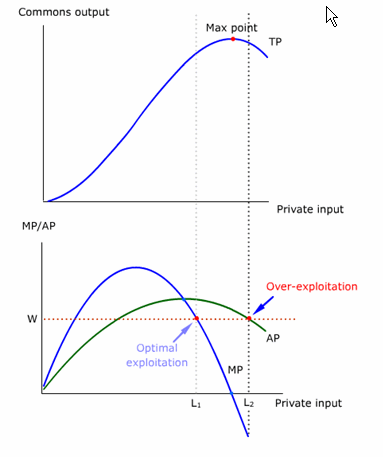Commission Rush
Excessive entry of residential real-estate brokers has resulted in lowering the median income of brokers rather than the commission rate.
Soaring home prices in recent years have led to rapid growth in percentage-based residential real-estate commissions in the U.S. From 2000 to 2004, such commissions rose by 42% to $61 billion. But membership in the National Association of Realtors went up by 63% in the same period. As a result, the median annual income of realtors fell from $39,300 in 2002 to only $37,600 in 2004.
On the surface, this appears to be a classic example of the tragedy of the commons. In such a tragedy, free entry into a common-resource pool ruins the pool for everybody. Specifically, entry will continue as long as the average income is at least equal to the last entrant’s opportunity cost (see Tragedy of the Commons). This level of entry generally exceeds the optimal level where the marginal product of the pool is equal to the entrant’s opportunity cost.
Unlike a common-resource pool with fixed renewable capacity, however, the pool of residential real-estate commissions is expanding. Thus, excessive entry of realtors did not affect the sustainability of the pool. Instead, it merely affects the median income of the realtors. Under normal circumstances, free entry is quickly self-limiting because excessive entry would have limited the size of the pool due to price competition. Price competition in turn will transfer gain from realtors to home buyers and sellers.
But for various reasons, the commission rate has remained fairly constant across the country. Among these reasons are legal prohibition of commission rebate to buyers/sellers in some states and peer pressure among realtors. When price competition is absent, the larger commission pie due to higher housing prices is dissipated among more realtors each seeking to get a share. The only persons who gain from such a food fight are the top realtors.
The heyday of percentage-based commission rate may be over. With the advent of the Internet, flat-fee brokers and for-sale-by-owner websites are steadily encroaching upon the turf of the full-fee realtors. And anti-trust investigation from the Justice Department and the Federal Trade Commission into the anti-competitive practice of the multiple-listing service may eventually spell the end of high percentage-based commission rate.
References:
- The New York Times. 1/3/2006. "Owners' Web Gives Realtors Run for Money."
- WSJ. 2/6/2006. "Broker commissions are the real component to the real-estate bubble."
- Chang-Tai Hsieh, Enrico Moretti "Can Free Entry be Inefficient? Fixed Commissions and Social Waste in the Real Estate Industry." NBER Working Paper No. 9208*September 2002.
Glossary:
- tragedy of the commonsTragedy of the commons occurs when over-exploitation of a limited-capacity resource due to unrestricted entry leads to its total collapse.

Topics:
Keywords
commission, competition, excessive entry, median income, real-estate brokers, realtors, tragedy of the commons
